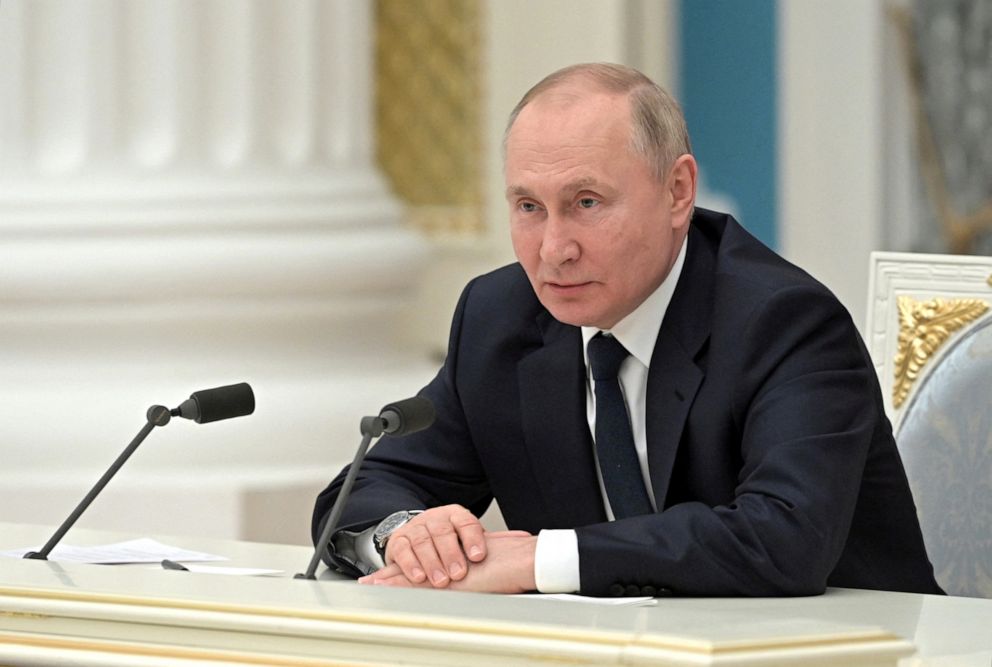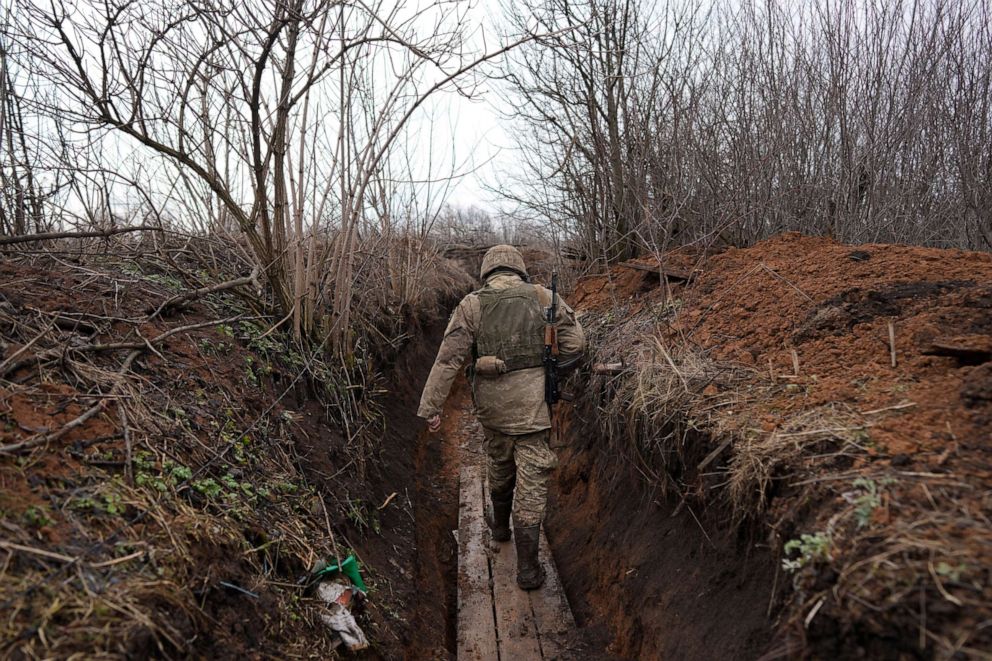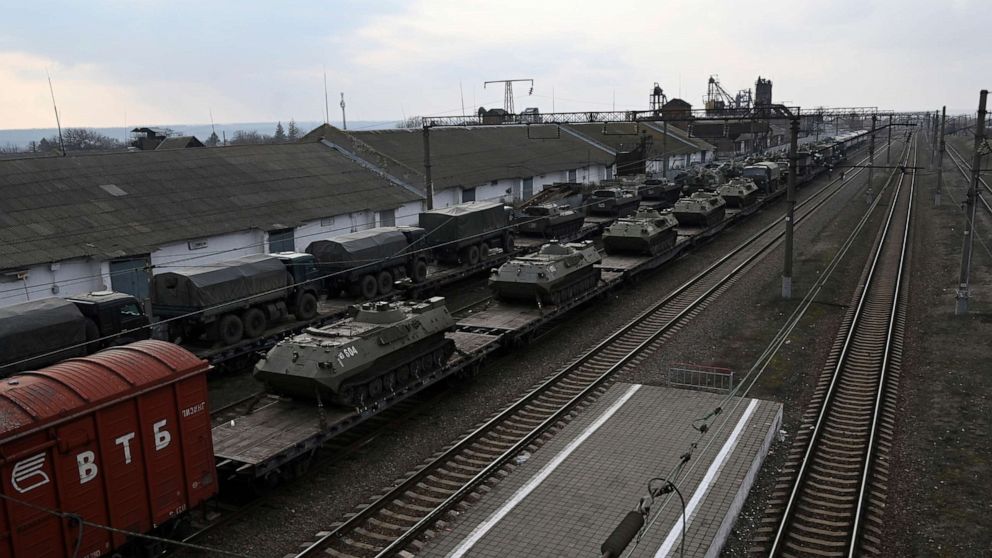Questions about the Ukraine-Russia conflict, answered
Russian President Vladimir Putin on Thursday launched an all-out military assault on Ukraine after weeks of denying "hysteria" from the West about the possibility of a Russian invasion.
Despite calling the attack a "special military operation" in the eastern Donbas region, bombing campaigns began across almost the entirety of Ukraine, including near the capital of Kyiv, and Russian forces crossed borders from three sides of Ukraine, including Russian-occupied Crimea to the south and Ukraine's neighbor Belarus to the north.
Putin claimed Russia's plans did not include occupying Ukraine, while warning other countries not to interfere or "face consequences greater than any you have faced in history."
This is not the first time in recent years that Russia has invaded Ukraine, a former Soviet republic. In 2014, Russia invaded Ukraine and annexed Crimea.
Here's what we know and don't:

Why is Putin invading Ukraine?
In December, the Kremlin published two draft treaties laying out its demands as it massed troops and weaponry around Ukraine. Chief among them were "security guarantees" that NATO bar Ukraine from membership and that the western military alliance (which started as a collective security pact against the Soviet Union) pull back its forces from Eastern European member states.
But in a ranting speech Monday night, Putin went further, laying out his false pretext for an invasion by questioning Ukraine's legitimacy as a country and even claiming it needed to be liberated from Nazis and pro-Nazi people. Putin also signaled he sees the current democratically elected government in Ukraine as criminal.
In addition, Putin used his speech Monday night to lament the end of the Soviet Union and claim that the countries created from Soviet republics weren't really independent. That led President Joe Biden and other world leaders to accuse Putin of trying to reestablish a Soviet empire -- something Putin denied the next day.
While it's impossible to see inside Putin's mind, those stated concerns have proven false. On Tuesday, he warned Russia was ready to provide "military assistance" to the two Russian-created separatist republics in eastern Ukraine, the self-proclaimed Donetsk People's Republic and Luhansk People's Republic.
But his assault on Ukraine hit targets far beyond those tiny separatist areas, where Russian forces have been covertly stationed since 2014.
"This was never about genuine security concerns on their part. It was always about naked aggression, about Putin's desire for empire by any means necessary," Biden said Thursday.
Who is involved?
Russia had been holding huge joint military exercises within Belarus, which shares a border with Ukraine, in the weeks leading up to the invasion -- while scoffing at concerns they would be used for an invasion. On Thursday, Russian and Belarusian forces attacked Ukraine from the north.
Other states, including the U.S. and European Union countries, had been attempting to resolve the conflict diplomatically. For weeks, the U.S., NATO, France, Germany, and others engaged in talks with Russia, while threatening heavy sanctions for any invasion and arming Ukraine with defensive lethal weapons.
But Biden and other Western leaders have made clear they will not deploy troops to Ukraine to support its military.
Still, a U.S. official told ABC News that surrounding nations are worried they will be overwhelmed with refugees fleeing Ukraine. Those surrounding nations include Poland, a NATO ally.
The Baltic States -- Estonia, Latvia and Lithuania -- also border Russia to the west and are members of NATO.
Should Russia invade any of them, as some fear, the United States has said it will uphold NATO's Article 5, which says an attack on any NATO country is an attack on them all and necessitates a military response.
"The United States, together with our allies, will defend every inch of NATO territory," Biden said Tuesday.
Biden has deployed thousands of U.S. troops to Europe, including the Baltics, to reassure allies of that promise.
What do we know about the separatists?
Putin recognized two Moscow-backed rebel regions within eastern Ukraine as independent states.
The two self-proclaimed People's Republics of Donetsk and Luhansk want to control the whole of eastern Ukraine's Donbas region, while they only held one-third of it before the Russian invasion.
The Russian-controlled separatists claimed they were under attack by Ukraine and were in need of military assistance from Russia "in repulsing Ukrainian aggression."
Many of these so-called aggressions have been exposed as false flag attacks, and called out as such by the U.S. government and allies. Before pulling out its personnel, the Organization for Security and Co-operation in Europe's war monitor reported an exponential increase in shelling and other attacks, but made clear it was largely from the separatists' territory.
How are the U.S. and its allies responding?
Biden announced sanctions against Russian elites and their families and four financial institutions on Thursday, as well as export controls that block key materials like semiconductors for Russia's defense and high-tech industries. Two days earlier, Biden unveiled sanctions on two smaller Russian banks and a first group of oligarchs, warning Putin not to attack or face these harsher punishments -- a threat that was ignored.
The U.K. on Thursday announced severe sanctions against more than 100 Russian individuals and entities, including freezing the assets of all major Russian banks and moving to exclude them from the U.K.'s financial system. The European Union also hit Russia with sanctions, including freezing assets.
The G-7 countries released a joint statement on Thursday condemning Russia's military aggressions and announcing it will adopt "severe" coordinated sanctions. Several members, like Japan and Canada, announced their own, while other nations like South Korea, Australia, and Taiwan have joined, too.
The U.S. also sanctioned 24 Belarusian officials, businesspeople, defense agencies and firms, state-owned companies and banks and financial institutions in response to "Belarus's support for, and facilitation of" Russia's invasion of Ukraine, the Treasury Department said in a statement.

What's at stake?
At least 137 people have been killed so far and several hundred have been injured, according to Ukrainian President Volodymyr Zelenskyy.
As the conflict continues to unfold, many Ukrainians will likely be forced to leave their country en masse, becoming refugees. There also may be large numbers of casualties.
Russian troops reportedly took full control of the area around the Chernobyl nuclear power station, including the plant itself, on Thursday, according to Ukraine's prime minister. The zone is about 60 miles north of Kyiv.
The destroyed Chernobyl reactor itself is sealed under a giant containment shield, a stadium-sized metal structure that was built over it and completed a few years ago.
But the biggest stakes are the rules-based order and general respect for sovereignty in Europe that has helped prevent all-out war for decades, potentially providing a playbook for further land grabs from Putin or other strongmen around the world.




